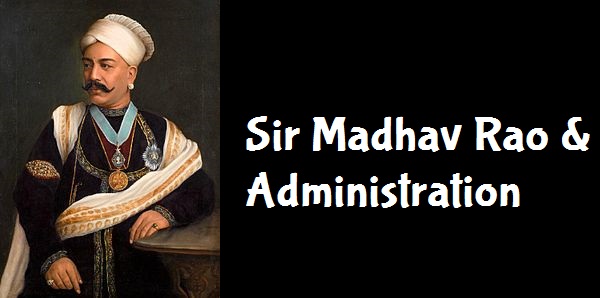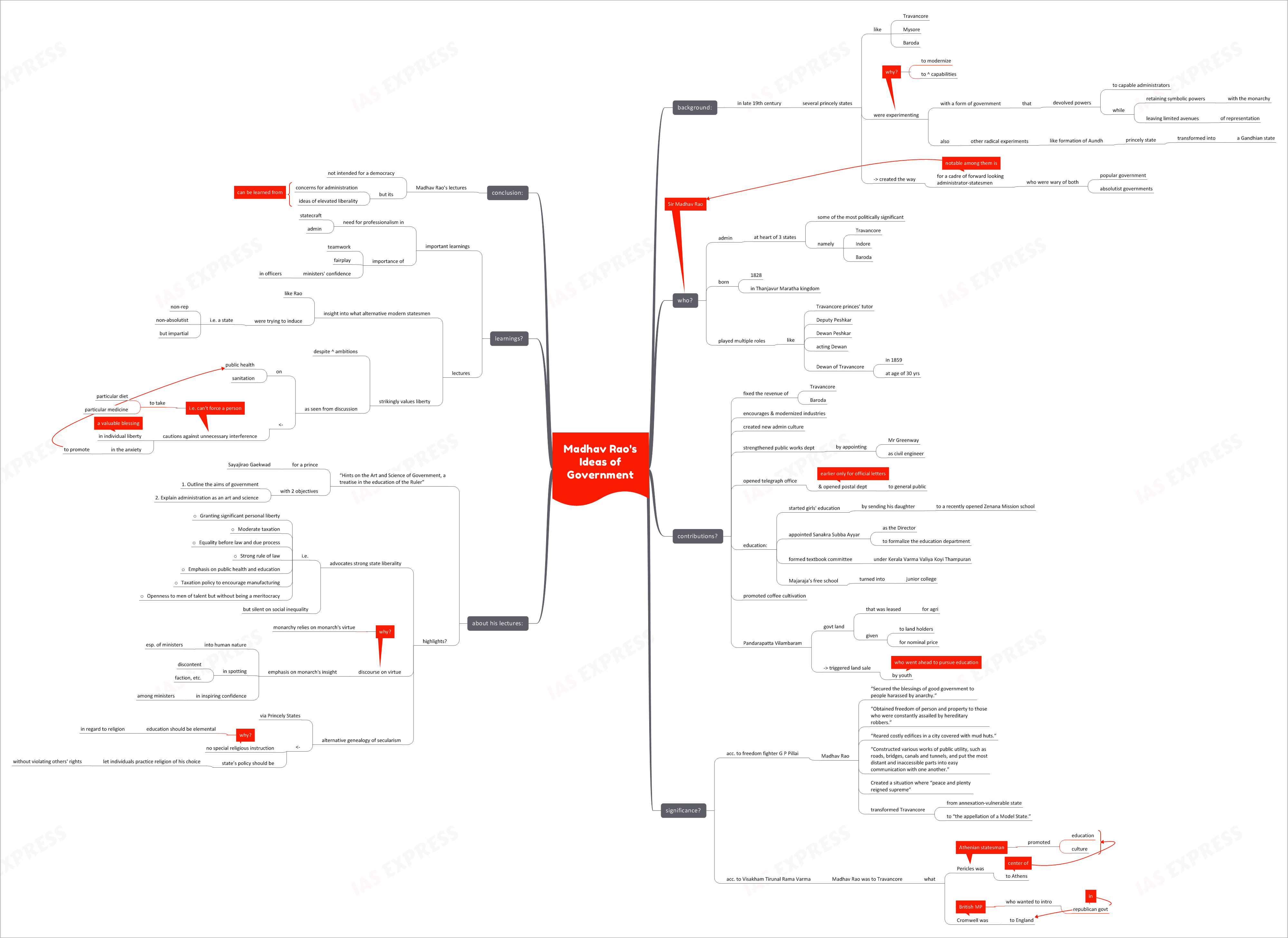Madhav Rao’s Ideas of Government

This topic of “Madhav Rao’s Ideas of Government” is important from the perspective of the UPSC IAS Examination, which falls under General Studies Portion.
Background:
- In the later 19th century, several princely states like Travancore, Mysore and Baroda, were experimenting with a form of government that devolved powers to capable administrators even while retaining the symbolic powers with the monarchy and leaving limited avenues of representation.
- There were other radical experiments like the formation of Aundh (a princely state transformed into a Gandhian state).
- They did this in order to modernize and improve their capabilities.
- These transforming states created the way for a cadre of forward looking administrator-statesmen who were as wary of popular government as of absolutist governments.
Who was Madhav Rao?
- One of the most notable among these administrator-statesmen was Sir Madhav Rao. He was at the heart of 3 of the most politically significant states- Travancore, Indore and Baroda.
- He was born in 1828 in Thanjavur Maratha kingdom.
- He has been in multiple roles like Travancore princes’ tutor, Deputy Peshkar, Dewan Peshkar, acting Dewan and in 1859, he was appointed as the Dewan of Travancore at the age of 30.
What are his contributions?
- Fixed the revenue of Travancore and Baroda states.
- Encouraged and modernized industries.
- Created new administrative cultures.
- Appointed Mr Greenway as Civil Engineer to strengthen of public works department in 1860.
- Opening of the telegraph office and the anchal/ postal department (till then carrying only official letters) started providing service to the general public.
- Triggered girls’ education by sending his daughter to a recently opened Zenana Mission school.
- Appointment of Sanakra Subba Ayyar as the Director to formalize the education department.
- Constitution of a textbook committee under Kerala Varma Valiya Koyi Thampuran.
- The Majaraja’s free school was turned into a junior college.
- Promotion of coffee cultivation.
- Pandarapatta Vilambaram- here the government land that were leased out for farming were given to land holders for nominal prices. This triggered youth to sell the land and pursue education.
Why is he a significant historical figure?
- Freedom fighter G P Pillai wrote that Madhav Rao:
- “Secured the blessings of good government to people harassed by anarchy.”
- “Obtained freedom of person and property to those who were constantly assailed by hereditary robbers.”
- “Reared costly edifices in a city covered with mud huts.”
- “Constructed various works of public utility, such as roads, bridges, canals and tunnels, and put the most distant and inaccessible parts into easy communication with one another.”
- Created a situation where “peace and plenty reigned supreme”.
- Transformed Travancore from being vulnerable to a constant threat of annexation to “the appellation of a Model State.”
- In the words of Visakham Tirunal Rama Varma, Madhav Rao did for Travancore what Pericles did for Athens and Cromwell did for England.
- Pericles was an Athenian statesman who is principally responsible for Athen’s reputation as the educational and cultural center of ancient Greece.
- Cromwell was a member of the British Parliament who attempted to introduce a republican government in England.
What is his lectures about?
- Madhav Rao was tasked with educating Sayajirao Gaekwad (prince). For this purpose, he gave a series of lectures titled, “Hints on the Art and Science of Government, a treatise in the education of the Ruler”.
- These lectures had 2 objectives:
- Outline the aims of government
- Explain administration as an art and science
- The lectures advocates a strong state liberality i.e.
- Granting significant personal liberty
- Moderate taxation
- Equality before law and due process
- Strong rule of law
- Emphasis on public health and education
- Taxation policy to encourage manufacturing
- Openness to men of talent but without being a meritocracy
- Notably, the lectures are silent on the topic of social inequality.
- Given how monarchies are reliant on virtuosity of the monarch, Rao’s lectures includes a discourse of virtue. It emphasizes the monarch’s acquisition of insight:
- Into human nature in general with particular focus on ministers
- In spotting discontent, faction, etc.
- In inspiring confidence among the ministers
- The lectures also contain an alternative genealogy of secularism via Princely States.
- Rao holds that no special religious instruction should be given for education should be elemental in regard to religion. The state’s policy should be to let individuals practice the religion of his choice, provided it doesn’t violate the rights of others.
What are the learnings?
- Notable learnings from Rao’s lectures:
- The need for professionalism in statecraft and administration
- Importance of teamwork and fair play
- Importance of ministers treating officers with confidence
- The lectures are an insight into what alternative modern statesmen like Rao were trying to induce i.e. a non-representative and non-absolutist but impartial administration.
- It is striking that even in such an ambitious state, importance is given to liberty. Following an extensive discussion on sanitation and public health, the lecture cautions against unnecessary interference with an individual’s liberty, in the anxiety to promote public health. It says that an individual mustn’t be forced to take a particular medicine or diet, for liberty is one of the most valuable blessings.
Conclusion:
Madhav Rao’s lectures isn’t a text intended for democracy, but its concerns for administration and the ideas of elevated liberality, in the best sense of the term, are something we can learn from.
Practice Question for Mains:
Examine Sir Madhav Rao’s ideas of government as given in his lectures. What can be learnt from it? (250 words)


